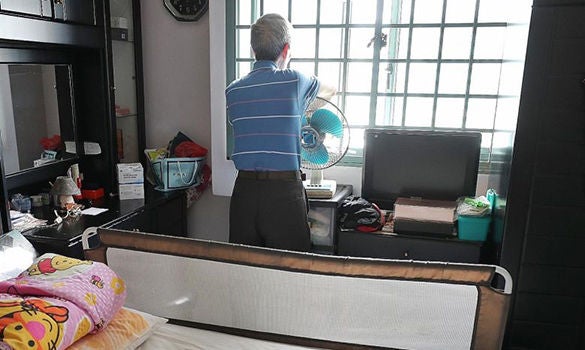
often involve intense - and even violent - movements, a far cry from his cordial and pleasant demeanour in the day. ST PHOTO: JONATHAN CHOO
Retiree Cheung Kau's dreams at night often involve intense - and even violent - movements, a far cry from his cordial and pleasant demeanour in the day. ST PHOTO: JONATHAN CHOO
Study to look into this condition which could be early sign of neuro-degenerative disorder
Retiree Cheung Kau once dreamt that he was playing football - and ended up kicking his wife while asleep. Another dream had the 75-year-old jumping over a drain to escape some thugs - only to fall off the bed with a thud.
His dreams at night often involve intense - and even violent - movements, a far cry from his cordial and pleasant demeanour in the day.
Many people do not think these sleep episodes are a problem, but they may indicate an underlying medical condition known as rapid eye movement (REM) sleep behaviour disorder, where patients act out their dreams at night.
"I would end up punching or kicking my wife without knowing it," said Mr Cheung, who suffers from the neurological sleep disorder. "The dreams last a few minutes. Sometimes, there can be several continuous dreams in one night.
"I would feel tired in the morning, even though I usually sleep about nine hours every night."
The prevalence of this disorder in Singapore is unknown, but it is estimated that under 1 per cent of the population here have the condition, and the National Neuroscience Institute (NNI) plans to conduct an in-depth study next year.
The condition is said to be an early sign appearing years before the diagnoses of other neuro-degenerative disorders, such as Parkinson's disease, multiple system atrophy and Lewy body dementia. The NNI study aims to determine the factors predicting the development of these other disorders.
Patients have "very vigorous and violent movements", including intense arguments and violent thrashing of the limbs during the REM sleep phase - a phase of sleep where dreaming occurs, Dr Xu Zheyu, a consultant at the NNI's neurology department, told The Straits Times.
Such episodes, which last from seconds to minutes, can occur once in several months to as often as nightly. For some, these episodes occur a few times every night.
Most patients are men older than 50, but it also affects teens and individuals in their 20s.
"A nice guy with the condition can become violent at night," said Dr Xu. "They can punch or kick their partners, or even fling themselves out of the bed - often without knowing. They find out what they have done only when their partners tell them the next morning."
A typical patient can often recall his vivid dreams. Once, Dr Xu's patient dreamt she was being attacked and ended up punching a nearby cupboard.
But many people do not see it as a medical problem. Patients have been known to experience such episodes for years, and even decades, before seeking help.
"They tend to brush it off as a normal phenomenon, an unusual dream or a sign of ageing," said Dr Xu. "Yet such vigorous and violent movements during their sleep can endanger their loved ones and themselves. It is common for patients to avoid seeking medical attention or treatment until they injure their partners."
For Mr Cheung, he first knew there was something odd in 2012, when his 68-year-old wife told him about the extreme sleep episodes.
Yet he did not see a doctor immediately, thinking these would go away. "But I knew something was wrong. It isn't normal for people to have such violent movements during sleep and my family was worried," said Mr Cheung, who saw a doctor months later.
Luckily, he and his wife have not suffered any injuries. The couple, who have four children aged between 32 and 42, live in a four-room HDB flat in Choa Chu Kang.
To treat the condition, doctors first conduct a sleep study to confirm the diagnosis. Treatment options include medication such as melatonin to combat jet lag and sleep problems like insomnia, or clonazepam, which helps relieve anxiety symptoms and certain types of seizures. The drugs have been found to be helpful in eliminating injurious behaviour.
Dr Xu said: "Early diagnosis and treatment help to reduce episodes of self-injury and allow for the monitoring of the development of future neuro-degenerative disorders."
Current studies suggest that over 90 per cent of patients will eventually develop one of these disorders.
Some patients have resorted to sleeping in another room or removing dangerous items within grasp, to avoid hurting themselves and their loved ones. Others pad up their beds or switch to special frames to avoid falling off the bed.
Mr Cheung now relies on clonazepam to help with his condition. His family has also installed a safety bed rail on his side of the bed.
"I still act out my dreams, but they are less frequent and the movements are less vigorous," he said. "I can now sleep better at night, and my family doesn't have to worry."
Contributed by














 Get it on Google Play
Get it on Google Play